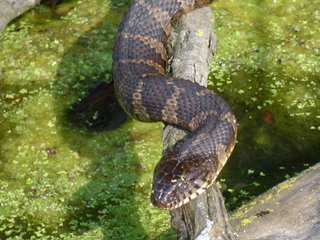Snakebit On Rainfall. Near Record Heat Ahead.

 More pictures from the "Crocodile Hunter" canoe trip with my brother, sister, and sister-in-law. I was in front of the canoe and my brother was at the helm. He's the one who spotted this huge water snake. I wanted to get in close enough for some nice pictures, Phil wanted to get close enough so there was a chance the snake might make a lunge at me. The whole time we were talking like Steve Irwin, while we were trying to get snapshots of this "gorrrrrrejussssss" snake. Click on the images to see them full size. The camera really captured the scales nicely.
More pictures from the "Crocodile Hunter" canoe trip with my brother, sister, and sister-in-law. I was in front of the canoe and my brother was at the helm. He's the one who spotted this huge water snake. I wanted to get in close enough for some nice pictures, Phil wanted to get close enough so there was a chance the snake might make a lunge at me. The whole time we were talking like Steve Irwin, while we were trying to get snapshots of this "gorrrrrrejussssss" snake. Click on the images to see them full size. The camera really captured the scales nicely.We seem to be snakebit with our rain chances lately. Rainfall in Chattanooga on Saturday was more of a nuisance than a help. Parts of West Tennessee got more than 5 inches on Saturday. Officially only .04" fell Friday and Saturday. And our chances for meaningful rain looks grim this week.
But our chances for near record heat look excellent the next two days. Here are the forecast highs and the record marks:
- Today: Record 99 set in 1999 - Forecast 96
- Tue: Record 98 set in 1999 - Forecast 97
- Wed: Record 99 set in 1987 - Forecast 95
- Thu: Record 100 set in 1957 - Forecast 94
- Fri: Record 105 set in 1947 - Forecast 93
I haven't seen sunspot activity discussed in any national publication or website recently, but what I've seen from The Solar and Heliospheric Observatory (SOHO) is interesting. We have a screensaver here in the Channel 3 Storm Alert Center that updates SOHO images of the sun. And the images the last few days have been interesting. There seems to be a lack of sunspots. See the following link for the latest SOHO image: http://sohowww.nascom.nasa.gov/data/realtime/mdi_igr/512/
We are currently in solar cycle 23 which according to the SOHO website began in May of 1996, peaked in April 2000, and is expected to end in early 2007. Or has this cycle ended somewhat early? There is some debate on whether or not sunspot cycles affects the Earth's climate. For a basic description of solar cycles and the Earth's climate check out this website:
http://www.crh.noaa.gov/fsd/astro/sunspots.php
I think it will be interesting to see if this apparent lack of sunspots pops up in any news reports in the near future.

0 Comments:
Post a Comment
<< Home